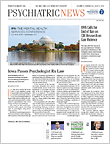Many people who experience a traumatic brain injury (TBI) will develop some degree of cognitive impairment, but identifying these cases can be challenging. Triaging has become an important element of the process, and in this regard brief clinical questionnaires like the Mini-Mental State Exam (MMSE) or Montreal Cognitive Assessment (MoCA) have become valuable tools to screen for potential cognitive dysfunction.
However, these tests have several limitations, noted Anthony Feinstein, M.D., Ph.D., director of the neuropsychiatry program at Toronto’s Sunnybrook Health Sciences Centre. One particular concern is that these assessments can misclassify many people because they do not do well in factoring in the age and education level of the patient.
As published June 3 in the Journal of Neuropsychiatry and Clinical Neurosciences in Advance, however, a simple computer-based tool developed by Feinstein’s research group could offer better sensitivity while retaining the brevity.
The computer application combines three separate tasks: the Stroop Test, the Symbol Digit Modalities Test (SDMT), and the Paced Visual Serial Addition Test 2 (PVSAT-2). Together, these brief tests measure three cognitive domains frequently compromised following TBI: working memory, attention, and processing speed.
Feinstein and his team have been adapting these pencil-and-paper tests for the computer for many years now, having originally tested this screening tool for cognitive impairment in multiple sclerosis (MS).
“One of the key factors in creating these tests for MS patients was to include no motor components, so the patient does not have to manipulate a mouse or push anything,” Feinstein told Psychiatric News. This same consideration applies to TBI patients, he said, as they often have upper body injuries as well.
“Other advantages are that the program is scripted simply, so it can be administered by a nurse or medical assistant, the providers who are usually the first port of call in the hospital setting,” he added. “And two of the three tests are scored by the computer, so the results can be computed right away, and the patient does not have to wait or come back to the clinic.”
In the current study, Feinstein and graduate student Jia Zhang enrolled 255 patients aged 14 to 62 years with various degrees of TBI—though predominantly mild TBI—and gave each participant a computerized assessment and a MoCA (both of which took around 10 minutes).
When using the standard cutoff of scoring lower than 26 (out of 30), 29 percent of the study participants failed the MoCA test; however, when factoring in the patient characteristics to reflect normal scores for age and education level, the failure rate dropped to 1.6 percent (four out of 255).
“In these TBI cases, particularly the mild ones, the MoCA was not very helpful at all when considering age and education,” Feinstein said.
The computer assessment, though, captured more impairment in this group. Among the 251 patients classified as cognitively normal, 55 percent failed at least one of the three tasks (29.5 percent failed the Stroop, 37.5 percent failed the SDMT, and 24.3 percent failed the PVSAT-2).
“We do not want to overreach with these findings, and even though this test is promising, it should not replace any detailed cognitive assessments,” Feinstein said. “But I think it could be a valuable addition to a clinic, and many colleagues here in other departments have begun using it.”
Feinstein also believes this computer test could be adapted for cognitive impairment arising from Alzheimer’s or another dementia. It would require some tweaking, as dementias strongly affect working memory, so the assessment should include a greater proportion of working memory tasks. ■
An abstract of “Screening for Cognitive Impairments After Traumatic Brain Injury: A Comparison of a Brief Computerized Battery With the Montreal Cognitive Assessment” can be accessed
here.
